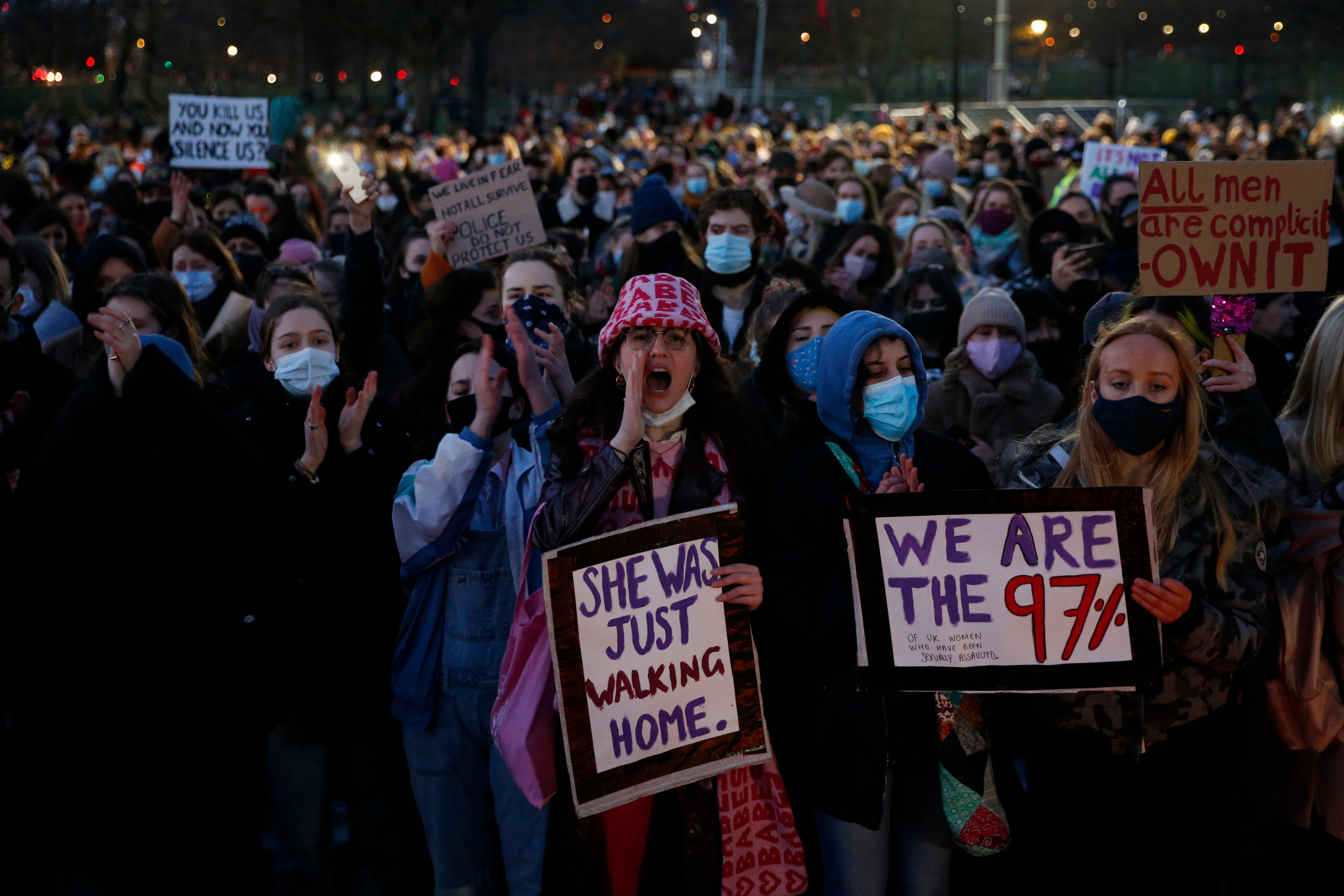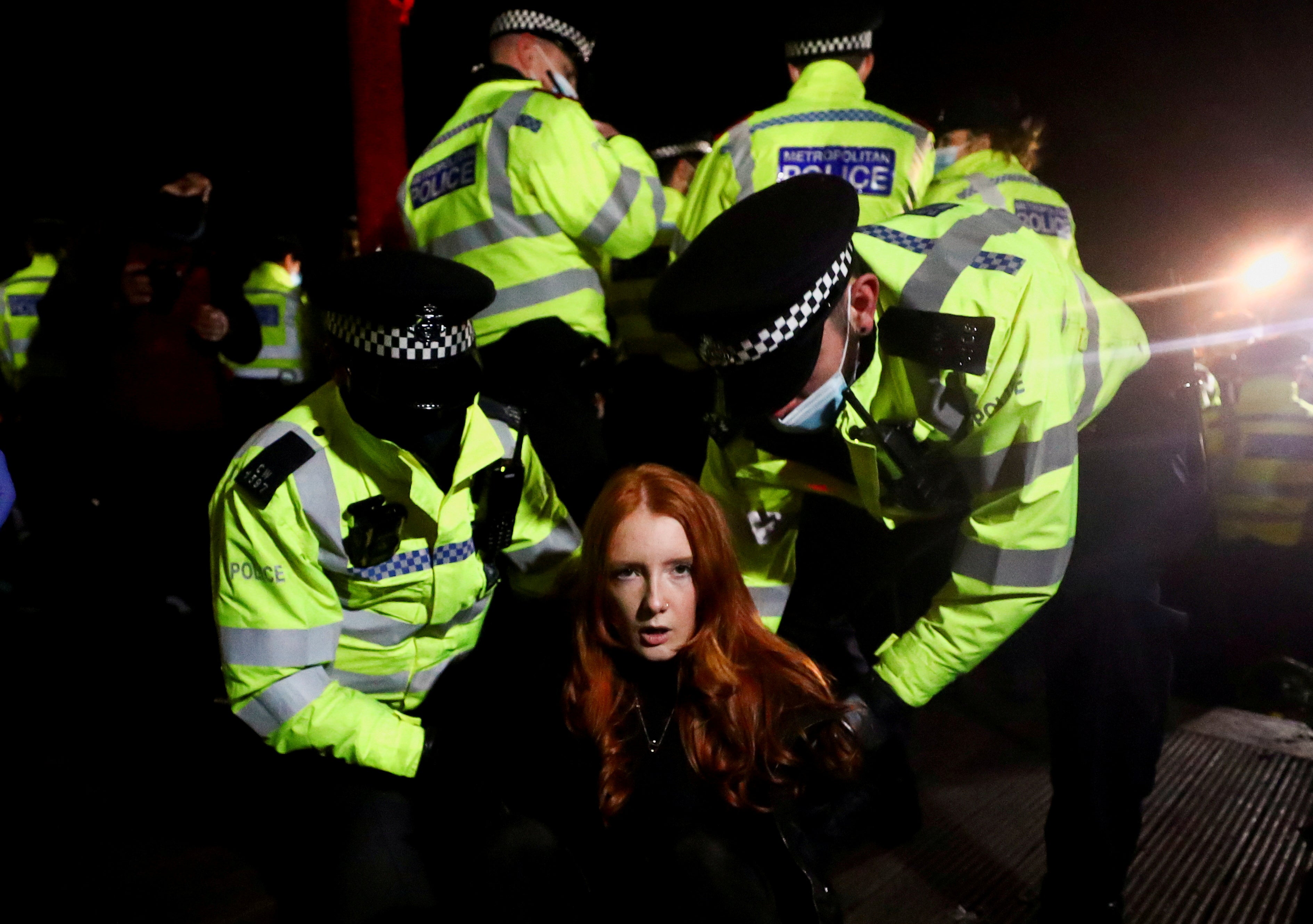Met Police ‘refused Sarah Everard vigil to avoid being seen as bad guys’
Campaigners argue Scotland Yard misinterpreted Covid laws and breached human rights

Your support helps us to tell the story
From reproductive rights to climate change to Big Tech, The Independent is on the ground when the story is developing. Whether it's investigating the financials of Elon Musk's pro-Trump PAC or producing our latest documentary, 'The A Word', which shines a light on the American women fighting for reproductive rights, we know how important it is to parse out the facts from the messaging.
At such a critical moment in US history, we need reporters on the ground. Your donation allows us to keep sending journalists to speak to both sides of the story.
The Independent is trusted by Americans across the entire political spectrum. And unlike many other quality news outlets, we choose not to lock Americans out of our reporting and analysis with paywalls. We believe quality journalism should be available to everyone, paid for by those who can afford it.
Your support makes all the difference.Police have been accused of refusing to facilitate a vigil for Sarah Everard to protect their reputation, out of fear they were “seen as the bad guys”.
Campaigners launched a legal challenge against Scotland Yard after it threatened organisers with arrest and £10,000 fines - despite one of its own officers being arrested for Ms Everard’s murder.
They argue that the Metropolitan Police’s claim that the vigil would have violated coronavirus laws in place at the time was wrong and caused a breach of human rights.
After the Reclaim These Streets group cancelled its planned vigil over legal fears, an unofficial event went ahead on Clapham Common.
Police were heavily criticised for forcibly dispersing the crowd, after being photographed pinning a handcuffed woman to the ground.
Ms Everard was kidnapped, raped and murdered by serving armed officer Wayne Couzens, whose arrest was announced on 10 March 2021.
Later that day, newly-formed women’s group Reclaim These Streets called a vigil on Clapham Common, where Ms Everard disappeared, for her and “all women who feel unsafe, who go missing from our streets and who face violence every day”.
On Wednesday, a High Court hearing was told that organisers liaised with police and Lambeth Council so the vigil could be managed safely and with a reduced risk of coronavirus transmission.
“The claimants repeatedly sought clarity from the Met as to what it would consider necessary to ensure the vigil could go ahead,” said Tom Hickman QC.
“However, despite a positive initial response from local officers, the vigil was effectively vetoed by central authorities at the Met.
“It made it clear that in its view the vigil would be an unlawful gathering under [Covid laws] and that it would consider enforcement action against the claimants as organisers.”
The court was told that Scotland Yard told organisers the vigil would be “illegal” at an initial meeting on 11 March, telling the women they could be fined £10,000 for organising a large gathering and arrested for assisting an offence.
The following day, senior Metropolitan Police officers held a meeting, where they confirmed their position and discussed the “threats” arising from the vigil.
“The most significant ‘threat’ identified was not public health but the perceived reputational risk to Scotland Yard,” Mr Hickman said in written submissions.
“Minutes from the meeting record that, ‘public confidence is the largest risk’ and that ‘we are seen as the bad guys at the moment, and we don’t want to aggravate this’.”
At the same time, the force prepared a public statement deterring the public from attending the vigil.
Reclaim These Streets launched an urgent judicial review of the police position, arguing that they had misinterpreted the law, butSarah Everard: High Court refuses to intervene over police attempt to ban Reclaim These Streets vigils
Mr Justice Holgate refused to make a declaration on the correct interpretation of the Health Protection Regulations, or a separate declaration that a policy prohibiting all protests was unlawful.
Scotland Yard then issued a statement warning people not to attend any vigil for Ms Everard and making clear it considered them unlawful, the High Court was told.
“The claimants decided that given the risk of criminal liability, the vigil would have to be cancelled and that they as individuals could not attend for fear of being held responsible,” Mr Hickman said.

The claimants - Jessica Leigh, Anna Birley, Henna Shah and Jamie Klingler - argue that decisions made by the force in advance of the planned vigil amounted to a breach of their human rights to freedom of speech and assembly, and say the force did not assess the potential risk to public health.
They are asking the High Court for a declaration that their rights were breached by the Metropolitan Police and “modest damages”, which would be donated to a charity concerned with violence against women.
“The event they sought to organise was about collective physical presence of women coming together to feel safe, supported, and to reclaim public space for Ms Everard and other women who have lost their lives,” Mr Hickman said.
“Rather than starting from the premise that the vigil represented an important exercise of individual rights to freedom of expression and association and seeking to facilitate the lawful exercise of those rights, they adopted the stance that the proposed gathering was unlawful and that the police should actively deter those organising it and attending it from doing so.”
Representatives of the Metropolitan Police will make their arguments as the case continues on Thursday.
In a statement issued before the hearing, the force said: “The Met was unable to give an advance assurance to the claimants that their involvement in organising the vigil would not put them at risk of enforcement action during, or subsequent to, that event.
“We do not believe our approach was founded on an inaccurate interpretation of the regulations or that this constituted an unlawful interference with the claimants’ rights.”


